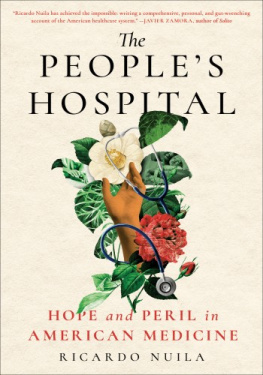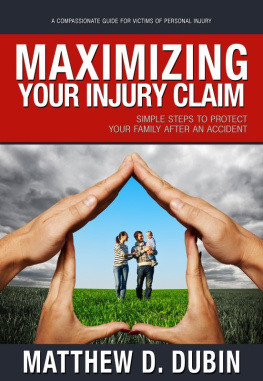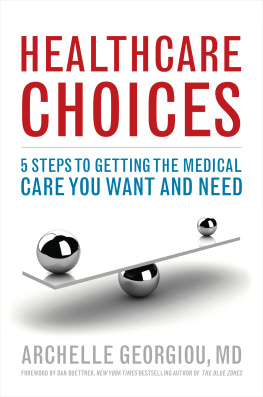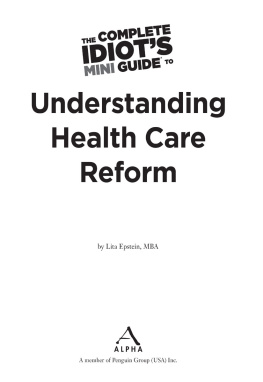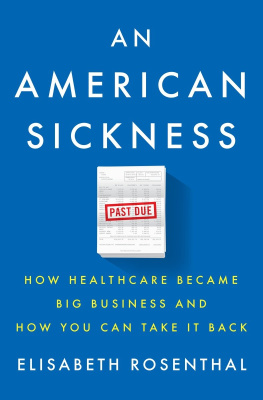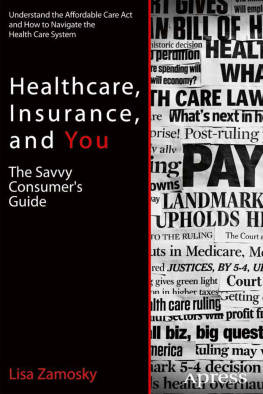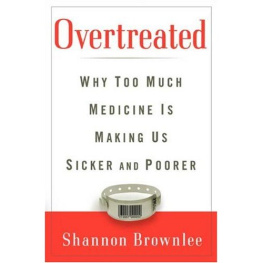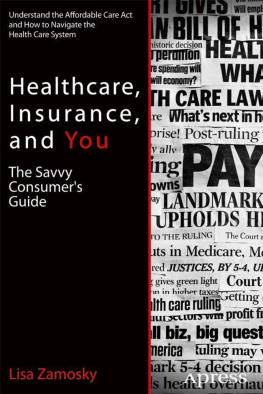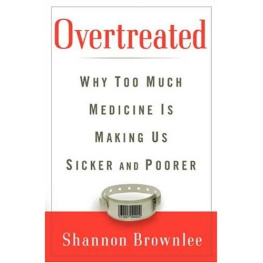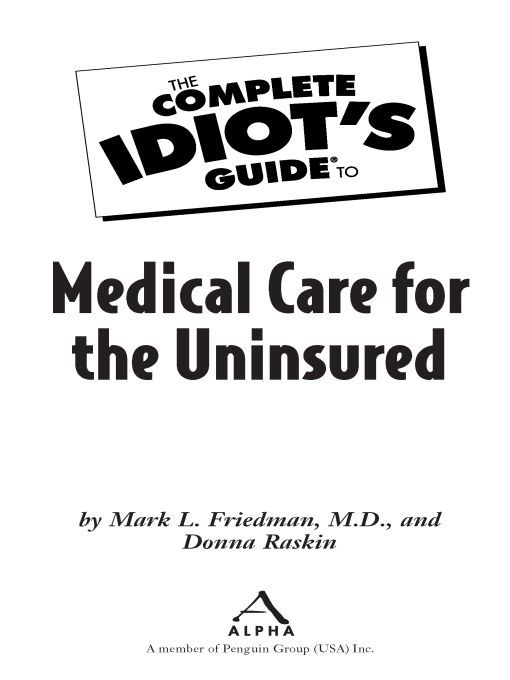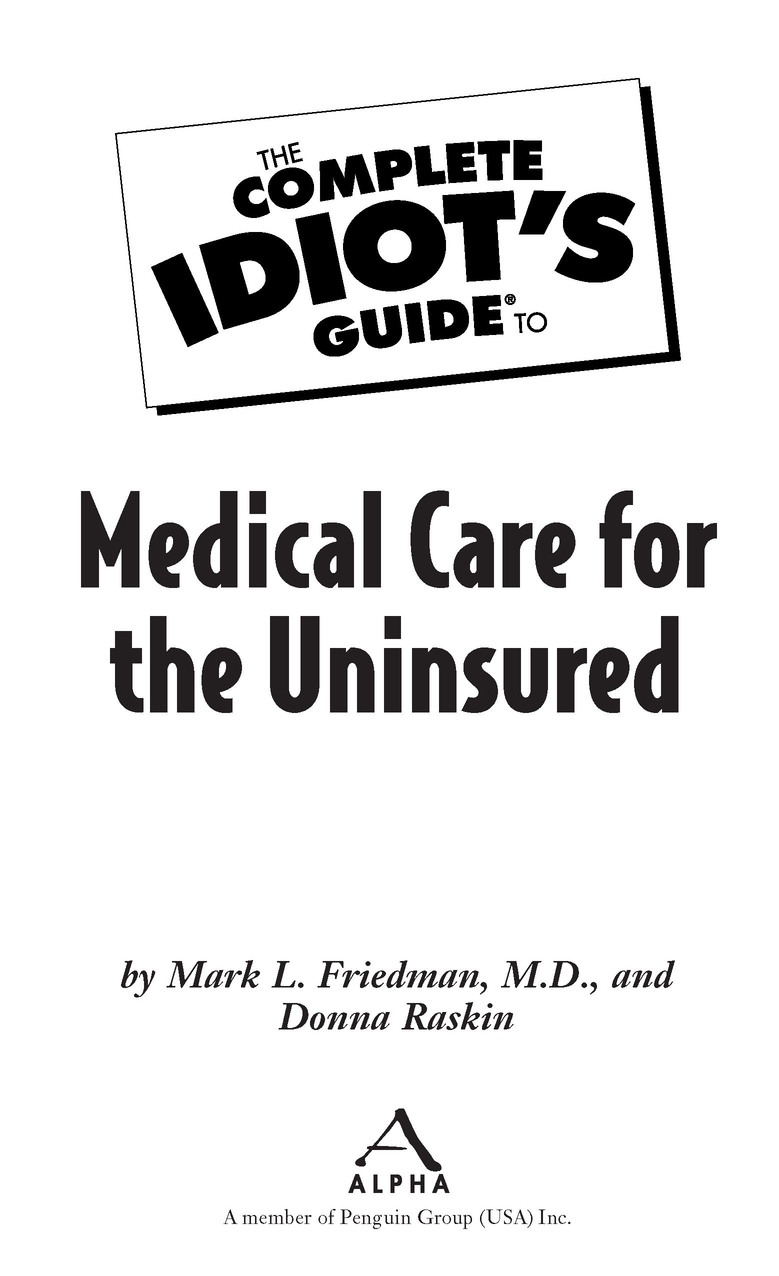Table of Contents
Mark L. Friedman, M.D., F.A.C.E.P., F.A.C.P., is President of Premium HealthCare Services. He is also Assistant Clinical Professor of Trauma and Emergency Medicine at the University of Connecticut. During Dr. Friedmans parallel business career he has been President of The Brighton Group, a medical billing and consulting company, CEO of National Medical Claims Analysts, and Vice President at Concentra Managed Care.
Dr. Friedman is a nationally recognized expert in medical claims analysis and cost containment. He has helped design programs to prevent medical errors and reduce malpractice litigation. He has served as an advisor to government on medical billing fraud and abuse, as a member of medical malpractice tribunals, and as a defense expert for medical liability insurers. He currently serves on the board of directors of the Connecticut College of Emergency Physicians. Dr Friedman is a frequent speaker and the author of Everyday Crisis Management and numerous articles and books.
Dr. Friedman is a graduate of the college and the medical school of the University of Chicago and the Kron Scholar Program of the University of North Carolinas Kenan Flagler School of Business. He is a Fellow of the American College of Physicians and a Life Fellow of the American College of Emergency Physicians.
Dr. Friedman welcomes reader comments. He can be reached at: mark@prmhcs.com.
Donna Raskin is a freelance writer whose books include The Everything Guide to Parenting Your One-Year-Old, The Everything Guide to Parenting Your Two-Year-Old, Yoga Beats the Blues, The Buddha, and The Single Womans Guide to Real Estate. Her articles have appeared in such magazines as Good Housekeeping, Mens Health, Ms., Self, Shape, Womans Day, and Yoga Journal. She has also written articles for The New York Times.
Dear Reader:
Every day in the United States, people discuss health insurance and health care. But all of the talk doesnt help the individual who simply wants to find a doctor, get her teeth fixed, or bring her child in for vaccinations without having to forgo paying the rent. This book is for you, one of the 47 million uninsured Americans without affordable employer-issued health insurance.
We wrote this book to show you that health care is available if you need it, and you dont have to go to an emergency room to get it. But finding available doctors, programs, and clinics isnt easy. And it isnt easy to navigate the red tape involved, either.
Were here to help. Our goal is to help you find good medical care that is affordable, comprehensive, and accessible no matter what your financial situation. And, once youve gotten the care you need, we want to help you figure out how to keep your bills as reasonable as possible.
Yours in good health,
Mark L. Friedman, M.D.
Donna Raskin
This book is dedicated to the doctors, nurses, and other providers who care for, and
care about, the uninsured. It is especially dedicated to emergency physicians who
make a career of treating all patients, regardless of their ability to pay. MF
Contents at a Glance
Part 1: Getting Coverage No Matter What Your Situation 1
1 Not Every Uninsured Person Is the Same 3
You arent just your insurance status.
2 Sorting Through Your Insurance Options 19
Dont scoff at the idea of coverage.
3 The Information You Need to
Get What You Need 49
Dealing with all of the paperwork.
4 Creating Your Own Health Insurance Plan 67
Learn how to make the system work for
you.
Part 2: Getting Care on an Ongoing Basis 89
5 General Health Care 91
Tests, clinics, and pharmacies.
6 Womens Health 107
Reproductive system care.
7 Childrens Health 137
Well children are well adults.
8 Health Care for People Ages 50-65 147
Tests and check-ups.
9 Mental Health Care 163
Diagnostic care and treatment.
10 Dental and Vision Care 175
Its more than your teeth and eyes.
11 Elective Procedures and Surgery 195
Choosing hospitals and caregivers.
Part 3: When You Need Care Now 209
12 When to Useand Avoidthe Emergency
Room 211
Accidents and heart attacks.
13 The Denied Claim 219
Fighting back for coverage.
14 Pay the Bill On Your Own Time 229
No health care is free.
Appendixes
A Glossary 243
B Resources 253
Index 257
Introduction
Today in the United States the quality of ones health depends not only on his family history and how well he takes care of himself but also on whether or not he has insurance. In general, Americans without insurance dont go to the doctor for preventive care, which means that if they have an illness, they are diagnosed when their disease is at a more advanced stage, and, finally, once diagnosed, the uninsured receive less care and die more often and sooner than people with insurance. In fact, throughout every stage of health and disease, no matter what the type of care, including general health, mental health, dental health, and specific diseases, Americans without insurance fare worse than those with insurance, according to the National Coalition on Health Care, an organization whose honorary co-chairs are former Presidents George Bush and Jimmy Carter.
It was certainly not always true that insurance was equal to health care in America, but just as medical breakthroughs have allowed us to live longer and better, the cost of health care has risen precipitously while, at the same time, the American economy has shifted from a manufacturing-based economy to a service economy. These changes in the job market as well as the populations general health and more advanced medical care have created a perfect storm of cost and need and availability, which has negatively affected the health-care industry (but certainly not the health insurance industry, which has seen rising profits during this transition).
Since the mid-1950s most Americans have received health insurance through their employers as a benefit counted above and beyond their salary. But since about the year 2000, employment is no longer a guarantee of health insurance coverage. There are a number of reasons for this change:
The move from manufacturing to service has reduced how many businesses offer insurance to employees.
More companies use part-time and contract or consultant workers who are not eligible for health insurance. In fact, by law, companies do not have to offer insurance to these workers because they arent technically employees.
Because health insurance premiums are so expensive, small employers often cant afford to offer health benefits to their employees.
Medium and large-size companies that do offer health insurance now have to ask their employees to contribute more money toward their coverage. Because these premiums are so expensive, more Americans simply go without insurance rather than paying the premium.


